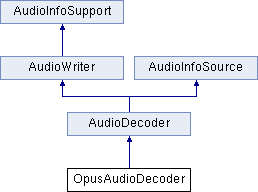Decoder for the Opus audio format. Each Opus frame must be provided with one write() call. Therefore, Opus is usually encapsulated in a container format (e.g., Ogg) that splits the stream into frames. More...
#include <CodecOpus.h>

Public Member Functions | |
| OpusAudioDecoder (bool releaseOnEnd=false) | |
| Construct a new OpusDecoder object. | |
| OpusAudioDecoder (Print &out_stream) | |
| Construct a new OpusDecoder object. | |
| virtual void | addNotifyAudioChange (AudioInfoSupport &bi) |
| Adds target to be notified about audio changes. | |
| AudioInfo | audioInfo () override |
| provides the actual input AudioInfo | |
| virtual AudioInfo | audioInfoOut () |
| bool | begin () override |
| virtual bool | begin (AudioInfo info) override |
| bool | begin (OpusSettings settings) |
| virtual void | clearNotifyAudioChange () |
| Deletes all change notify subscriptions. | |
| OpusSettings & | config () |
| Provides access to the configuration. | |
| OpusSettings & | defaultConfig () |
| void | end () override |
| Print * | getOutput () |
| bool | isNotifyActive () |
| Checks if the automatic AudioInfo update is active. | |
| virtual bool | isResultPCM () |
| Returns true to indicate that the decoding result is PCM data. | |
| operator bool () override | |
| virtual bool | removeNotifyAudioChange (AudioInfoSupport &bi) |
| Removes a target in order not to be notified about audio changes. | |
| void | setAudioInfo (AudioInfo from) override |
| for most decoders this is not needed | |
| virtual bool | setCodecConfig (const uint8_t *data, size_t len) |
| Some decoders need e.g. a magic cookie to provide the relevant info for decoding. | |
| void | setNotifyActive (bool flag) |
| Deactivate/Reactivate automatic AudioInfo updates: (default is active) | |
| virtual void | setOutput (AudioOutput &out_stream) |
| Defines where the decoded result is written to. | |
| virtual void | setOutput (AudioStream &out_stream) |
| Defines where the decoded result is written to. | |
| void | setOutput (Print &out_stream) override |
| Defines the output Stream. | |
| void | setReleaseOnEnd (bool flag) |
| size_t | write (const uint8_t *data, size_t len) override |
| write one full opus frame | |
Public Attributes | |
| int | id |
| custom id to be used by application | |
Protected Member Functions | |
| bool | isValidRate (int rate) |
| void | notifyAudioChange (AudioInfo info) |
| void | writeBlocking (Print *out, uint8_t *data, size_t len) |
Protected Attributes | |
| bool | active = false |
| OpusSettings | cfg |
| OpusDecoder * | dec = nullptr |
| Vector< uint8_t > | decbuf {0} |
| AudioInfo | info |
| bool | is_notify_active = true |
| Vector< AudioInfoSupport * > | notify_vector |
| Vector< uint8_t > | outbuf {0} |
| Print * | p_print = nullptr |
| bool | release_on_end = false |
| const uint32_t | valid_rates [5] = {8000, 12000, 16000, 24000, 48000} |
Detailed Description
Decoder for the Opus audio format. Each Opus frame must be provided with one write() call. Therefore, Opus is usually encapsulated in a container format (e.g., Ogg) that splits the stream into frames.
Depends on https://github.com/pschatzmann/arduino-libopus.git
- Copyright
- GPLv3
Constructor & Destructor Documentation
◆ OpusAudioDecoder()
|
inline |
Construct a new OpusDecoder object.
- Parameters
-
out_stream Output Stream to which we write the decoded result
Member Function Documentation
◆ addNotifyAudioChange()
|
inlinevirtualinherited |
Adds target to be notified about audio changes.
Reimplemented in CodecNOP, EncodedAudioOutput, EncodedAudioStream, AACDecoderFDK, DecoderBasic, CodecChain, MP3DecoderHelix, MP3DecoderMAD, OggContainerDecoder, RTSPClient< TcpClient, UdpSocket >, Pipeline, and Pipeline::ModifyingStreamAdapter.
◆ audioInfo()
|
inlineoverridevirtual |
provides the actual input AudioInfo
Reimplemented from AudioDecoder.
◆ audioInfoOut()
|
inlinevirtualinherited |
provides the actual output AudioInfo: this is usually the same as audioInfo() unless we use a transforming stream
Reimplemented in PureDataStream, PWMAudioOutput, ChannelFormatConverterStreamT< T >, ChannelFormatConverterStream, NumberFormatConverterStreamT< TFrom, TTo >, NumberFormatConverterStream, FormatConverterStream, Pipeline, ResampleStream, and ResampleStreamT< TInterpolator >.
◆ begin() [1/2]
|
inlineoverridevirtual |
Reimplemented from AudioDecoder.
◆ begin() [2/2]
|
inlineoverridevirtualinherited |
Reimplemented from AudioWriter.
◆ clearNotifyAudioChange()
|
inlinevirtualinherited |
Deletes all change notify subscriptions.
Reimplemented in RTSPClient< TcpClient, UdpSocket >.
◆ end()
|
inlineoverridevirtual |
Reimplemented from AudioDecoder.
◆ isResultPCM()
|
inlinevirtualinherited |
Returns true to indicate that the decoding result is PCM data.
Reimplemented in CopyDecoder, DecoderNetworkFormat, and ContainerM4A.
◆ operator bool()
|
inlineoverridevirtual |
Implements AudioWriter.
◆ removeNotifyAudioChange()
|
inlinevirtualinherited |
Removes a target in order not to be notified about audio changes.
Reimplemented in RTSPClient< TcpClient, UdpSocket >.
◆ setAudioInfo()
|
inlineoverridevirtual |
for most decoders this is not needed
Reimplemented from AudioDecoder.
◆ setCodecConfig()
|
inlinevirtualinherited |
Some decoders need e.g. a magic cookie to provide the relevant info for decoding.
Reimplemented in DecoderALAC, and MultiDecoder.
◆ setOutput() [1/3]
|
inlinevirtualinherited |
Defines where the decoded result is written to.
Reimplemented in ADTSDecoder, CodecChain, MTSDecoder, MTSDecoderTSDemux, and MetaDataFilterDecoder.
◆ setOutput() [2/3]
|
inlinevirtualinherited |
Defines where the decoded result is written to.
Reimplemented in ADTSDecoder, CodecChain, MTSDecoder, MTSDecoderTSDemux, and MetaDataFilterDecoder.
◆ setOutput() [3/3]
|
inlineoverridevirtual |
Defines the output Stream.
Reimplemented from AudioDecoder.
◆ setReleaseOnEnd()
|
inline |
Defines if the resources should be released when the stream is closed (default: false)
◆ write()
|
inlineoverridevirtual |
write one full opus frame
Implements AudioWriter.
The documentation for this class was generated from the following file:
- src/AudioTools/AudioCodecs/CodecOpus.h